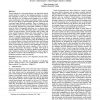Free Online Productivity Tools
i2Speak
i2Symbol
i2OCR
iTex2Img
iWeb2Print
iWeb2Shot
i2Type
iPdf2Split
iPdf2Merge
i2Bopomofo
i2Arabic
i2Style
i2Image
i2PDF
iLatex2Rtf
Sci2ools
HAPTICS
2009
IEEE
2009
IEEE
Effects of magnitude and phase cues on human motor adaptation
Recent findings have shown that humans can adapt their internal control model to account for the changing dynamics of systems they manipulate. In this paper, we explore the effects of magnitude and phase cues on human motor adaptation. In our experiments, participants excite virtual second-order systems at resonance via a two-degree of freedom haptic interface, with visual and visual plus haptic feedback conditions. Then, we change the virtual system parameters and observe the resulting motor adaptation in catch trials. Through four experimental conditions we demonstrate the effects of magnitude and phase cues on human motor adaptation. First, we show that humans adapt to a nominal virtual system resonant frequency. Second, humans shift to higher and lower natural frequencies during catch trials regardless of feedback modality and force cues. Third, participants can detect changes in natural frequency when gain, magnitude, and phase cues are manipulated independently. Fourth, particip...
| Added | 21 May 2010 |
| Updated | 21 May 2010 |
| Type | Conference |
| Year | 2009 |
| Where | HAPTICS |
| Authors | Ali Israr, Hakan Kapson, Volkan Patoglu, Marcia Kilchenman O'Malley |
Comments (0)

